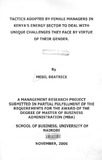| dc.description.abstract | The objectives of study were to establish the tactics used by female managers in
Kenya's energy sector to deal with the unique challenges they face by virtue of
their gender and to establish the extent to which women managers in Kenya's
Energy sector use these tactics.
Women in the Third word work under very difficult conditions. The higher up the
ladder one climbs, the harder it gets. Adler and Izraeli (1998) decry the paucity
of women in management worldwide and posit that the reasons are similar
internationally. These reasons include cultural sanctions, educational barriers,
legal restrictions, corporate obstacles and women's disinterest in pursuing
traditional masculine career. Davidson and Cooper (1990) have identified some
challenges facing women managers, which are internal to the woman herself
(Carr-Ruffino 1987) such the conflict between socialized values of caring for the
family, self limiting beliefs, possessing conflicting beliefs, combating negative
beliefs and stereotypes and not being aggressive, and the harder values found in
male dominated competitive organizational cultures or external from the work
environment, where the role expectations of an executive are still largely male
and mobile, possible sexual harassment, heavy executive role expectations,
patron male bosses, threatened male colleagues, blocked promotions, pay
disparity, the glass ceiling, queen bee syndrome and the wonder woman
syndrome from the home environment where the woman may still be responsible
for most of the domestic chores and child/elder care.
The study established tactics, which were used and were effective to a great
extent by the female managers to deal with the unique challenges they face by
virtue of their gender at work place were assertiveness, development of good
relationships with other women employees and development of favorable
leadership styles. However, use "of artificial make up products and joining the
male club were less effective and were used to a small extent by the female
managers. The use of artificial make up products and joining the male club should be
encouraged among women managers in Kenya, as they have proved effective in
the western world. Women managers as well as women employees in general
should be enlightened on the tactics to use to deal with unique problems they
face by virtue of their gender | en |

